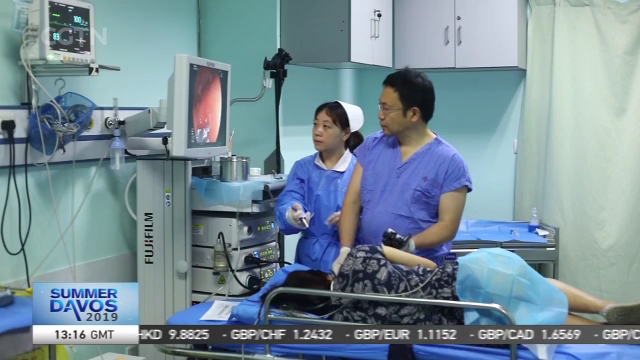
22:05, 01-Jul-2019
Cancer Screening Breakthrough: AI-assisted colonoscopy increases polyp detection rates
Updated
16:58, 09-Jul-2019

Detecting and removing precancerous polyps is known to be the "gold standard" in preventing colon cancer. And it seems, a breakthrough has been made in this area. Chinese doctors came up with the idea of creating an AI system to increase the detection rate of colorectal polyps, which are often the precursors to cancer. CGTN's Wei Lynn Tang has more from Sichuan province, where the study originated and the first set of randomized controlled trials was carried out.
A clinical trial in a real setting. A colonoscopy procedure is underway. Doctor Wang Pu is on the hunt for any abnormalities, including polyps. A blue box and an alarm alert him to a possible polyp. And another one. Here, Doctor Wang is assisted by a real-time automatic polyp detection system. In a routine colonoscopy, he would be relying solely on his eyes.
WANG PU, GASTROENTEROLOGIST SICHUAN PROVINCIAL PEOPLE'S HOSPITAL "The value of the AI system is for the easy-to-miss polyps. For example, some polyps are partially occluded by feces or fluid, and some polyps are very flat without a clear boundary. So with AI, we can reduce the misdiagnosis of such polyps."
WEI LYNN TANG CHENGDU "Medical experts say, while most polyps are benign, a sub-type known as adenomas can eventually become cancerous. And in most cases, they don't trigger any early symptoms, it's hard to know if you've developed them. And this is why it's all the more crucial to get your screening done."
If a biopsy confirms the polyps are adenomas, they can be removed promptly. Dr. Wang was the first author of this study - along with Chinese doctors from the Sichuan Academy of Medical Sciences, researchers from Harvard Medical School, and others.
The first randomized controlled experiment showed an increase of adenoma detection rate by almost 50 percent.
Evidence has shown that an increase in the adenoma detection rate is associated with the decrease of interval cancers, those detected within 12 months of screening.
In this study, the higher detection rate was mainly due to smaller adenomas. Dr. Wang explains why this is important.
WANG PU, GASTROENTEROLOGIST SICHUAN PROVINCIAL PEOPLE'S HOSPITAL "And everyone knows smaller polyps bear less possibility to transform to cancer. But even the risk of each small polyp is low, the number is huge, so the overall expected cancer instance is not negligible. So this system has some significance to the ultimate goal of reducing interval colorectal cancer."
Doctor Liu Xiaogang, a co-author of the study, has been in this line for 25 years. He hails this AI-system as unprecedented and a breakthrough in the field of gastroenterology.
LIU XIAOGANG, CHIEF PHYSICIAN GASTROENTEROLOGY DEPT, SICHUAN PROVINCIAL PEOPLE'S HOSPITAL "If my physical strength isn't good, my productivity and accuracy in performing an endoscopy in the morning and afternoon would be different. Second, my experience 10 years ago and now, is different. Also, if patients don't prepare well for a scope, even if I want to be on the lookout for polyps, I may not find them. So only by increasing detection rates can we reduce the country's increase in large intestinal diseases."
Dr. Liu did say that the AI system presently over-detects on anything that looks like a polyp. So, next steps include: to further train the system to reduce instances of false positives, as well as to look into the slight delay of the system, with the goal of long-distance use. In the meantime, there are plans to expand the study's sample size.
LI LIANGPING, CHIEF PHYSICIAN GASTROENTEROLOGY & HEPATOLOGY DEPT, SICHUAN PROVINCIAL PEOPLE'S HOSPITAL "We may apply this study to a few other centers, to include doctors at the county and grassroots level to take on this research. If we can increase their capabilities to increase the detection rate of adenomatous polyps, we can benefit more patients."
A blind control was used to reduce operational bias. Endoscopists didn't know they were using an AI system. Meanwhile, a tandem study, with a back-to-back procedure of a routine and an AI-assisted colonoscopy, is in the works. All these are steps to further validate the effectiveness of the system. As the old saying goes, an ounce of prevention is worth a pound of cure. WLT, CGTN, Chengdu city in Sichuan province.
SITEMAP
Copyright © 2018 CGTN. Beijing ICP prepared NO.16065310-3
Copyright © 2018 CGTN. Beijing ICP prepared NO.16065310-3